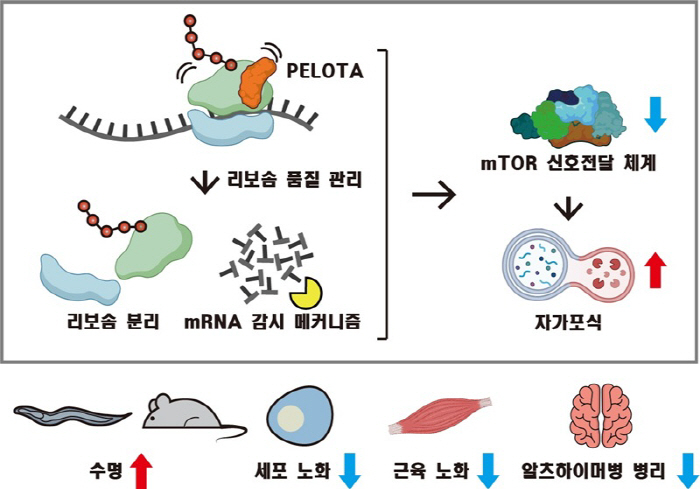Korean researchers identify proteins that play a key role in controlling aging and inducing longevity
Aug 18, 2025
|
The Korea Advanced Institute of Science and Technology (KAIST) announced that a joint research team of Professor Lee Seung-jae of the Department of Life Sciences, Professor Seo Jin-soo of Yonsei University, and Dr. Lee Kwang-pyo of the Korea Institute of Biotechnology confirmed that the 'PELOTA' protein, which manages the quality of ribosomes, plays a role in slowing the aging rate.
The study was published as of August 4 in the global scientific journal `PNAS' with Dr. Lee Jong-sun of KAIST's Department of Life Sciences, Dr. Kim Eun-ji and Dr. Lee Bo-ra of KRIBB and Dr. Lee Hye-in of Yonsei University as co-first authors.
MRNA (messenger ribonucleic acid, messenger RNA) translates proteins from deoxyribonucleic acid (DNA), which is genetic information in cells, and delivers them to ribosomes, a protein factory in the cytoplasm. Pelota proteins manage the quality of ribosomes by removing abnormal mRNAs in this process.
Until now, there has been a strong recognition that RNA, especially mRNA, is only an intermediate product for protein synthesis. Quantitative analysis or long-term follow-up studies were not easy because they were more unstable and had a shorter lifespan than DNA. Due to these limitations, studies on the physiological and functional role of RNA itself have been relatively scarce. It is known that when aging progresses, DNA and protein quality in cells deteriorate, causing various degenerative diseases, but the association with aging at the RNA level has not been clearly identified.
The research team revealed the function of pelota protein at the RNA level using 'Pretty Little Nematode' (nematodes with a length of about 1 mm), which are widely used in aging research due to their short lifespan. In particular, when pelota was overexpressed in normal nematodes, its lifespan was extended, demonstrating that ribosome-based quality control, which is important for the elimination of abnormal mRNA, is necessary for the induction of longevity.
In addition, the ribosome quality management system revealed that cells, which are important for aging and in vivo energy metabolism control, control growth, protein synthesis, and autophagy by sensing nutritional status or growth signals, and cells self-decompose and recycle unnecessary or damaged components by themselves.
Lack of pelota led to abnormal activation of mTOR and suppression of autophagy function, which promoted aging, whereas activation of pelota allowed mTOR suppression and induction of autophagy to maintain cell homeostasis and prolong lifespan. Of particular note, this finding has also been preserved in mice and humans, with results suggesting that Pelota's deletion may cause muscle aging and Alzheimer's disease.
The research team believed that this study could also contribute to the establishment of treatment strategies for human aging and degenerative brain diseases.
Professor Seung-Jae Lee said, "'Until now, the association between quality control and aging at the DNA and protein level has been well known, but molecular evidence that RNA-level quality control systems are functionally involved in lifespan regulation has been very rare' and "This study provides strong evidence to show that abnormal RNA removal is one of the key pillars of aging control networks"
This article was translated by Naver AI translator.














